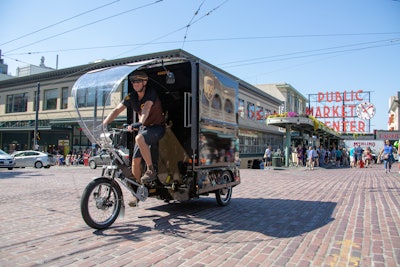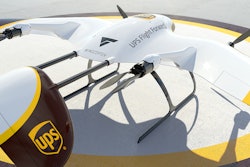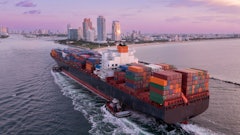
UPS is getting back to it roots. The logistics company, which started in Seattle in 1907 as a bicycle messenger company, and Seattle Mayor Jenny Durkan unveiled an urban delivery pilot Thursday that features the use of pedal-assist cargo eBikes and customized, modular trailers. The project will address a number of urban delivery challenges, including growing traffic congestion and air quality concerns.
“While we have launched cycle logistic projects in other cities, this is the first one designed to meet a variety of urban challenges,” says Scott Phillippi, UPS’s senior director of maintenance and engineering, international operations. “The modular boxes and trailer allow us to expand our delivery capabilities and meet the unique needs of our Seattle customers. It’s exciting to return to our roots—UPS started in Seattle in 1907 as a bicycle messenger company. We’re looking forward to being able to offer these customizable urban delivery solutions to other cities nationwide.”
Developed in collaboration with Silver Eagle Manufacturing using Truck Trikes, the cargo eBike system will have removable cargo containers that are deployed via a specially designed trailer. UPS says this “plug and play” design will provide greater flexibility to meet varying delivery needs and allow drivers to make deliveries in areas conventional delivery trucks can’t access directly and currently require that trucks be parked on the periphery for long periods of time. The company notes this will reduce congestion in these areas by reducing truck dwell time, instances of double parking and other unintended consequences associated with downtown deliveries.
UPS partnered with the Seattle Department of Transportation to develop plans for the new pilot program. If successful, UPS will expand the route and consider additional cargo eBike deliveries in other areas of the city. This is the first tailored urban delivery solution to address growing traffic congestion in Seattle’s downtown corridor and is part of UPS’s Cycle Logistics Solutions that help reduce carbon emissions, noise and traffic.
The UPS cargo eBike is equipped with a battery-powered electric motor that can travel longer distances than traditional bikes, carry substantial loads and navigate hills and other terrain. The modular, detachable boxes on the trailer can hold up to 400 pounds and have a 95-cubic-foot capacity. The bikes can be operated with human pedal power or battery power, providing drivers with the flexibility they need to navigate changing terrain and energy efficiency.
“Seattle has always been the city that invents the future, and now we are partnering with one of our hometown companies to help drive innovations in transportation,” says Durkan. “As Seattle grows and public and private mega-projects limit capacity on our downtown streets, this pilot will help us better understand how we can ensure the delivery of goods while making space on our streets for transit, bikes and pedestrians. We are eager to learn how pilots like these can help build a city of the future with fewer cars, more transit and less carbon pollution.”
UPS and the University of Washington Urban Freight Lab will evaluate the cargo eBike’s reliability, design and integration into Seattle’s infrastructure over the next year. The Urban Freight Lab is an initiative that brings together transportation engineers and urban planners who manage public spaces with retailers, freight carriers and technology companies supporting transportation solutions. UPS will share data and analyses from the pilot for assessment against two of the lab’s key objectives: improving first delivery attempts and reducing “dwell time,” both of which should reduce traffic congestion and pollution.
The UPS eBike was first demonstrated in 2012 in Hamburg, Germany, and serves as a prototype for the company’s newest cargo eBike in Seattle. The company also operates inner-city delivery projects with delivery on foot and by bike in more than 30 major cities worldwide, including Leuven and Mechelen, Belgium; Paris and Toulouse, France; Frankfurt, Hamburg, Herne, Offenbach, Oldenburg and Munich, Germany; Dublin, Ireland; Rome and Verona, Italy; and London, U.K., in addition to the one other eBike previously operating in the United States in Pittsburgh.



![Pros To Know 2026 [color]](https://img.sdcexec.com/mindful/acbm/workspaces/default/uploads/2025/08/prostoknow-2026-color.mduFvhpgMk.png?auto=format%2Ccompress&bg=fff&fill-color=fff&fit=fill&h=100&q=70&w=100)








![Pros To Know 2026 [color]](https://img.sdcexec.com/mindful/acbm/workspaces/default/uploads/2025/08/prostoknow-2026-color.mduFvhpgMk.png?ar=16%3A9&auto=format%2Ccompress&bg=fff&fill-color=fff&fit=fill&h=135&q=70&w=240)
